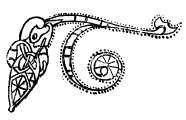
Bothachs and Sen-Cleithes

HE word Bothach being connected with bothan, a cabin, it is inferred that the people called by this name were cottiers. Sen-Cleithe means Old Stake, or old adherent, and the people so called were the poor adherents and dependants of the flaiths, such as servants, herds, horse-boys, cart-boys, dog and hawk-boys, &c. Various writers describe both these classes as prisoners of war or their descendants. For my own part I believe that these two classes consisted wholly of persons born in the territory. Their very names indicate as much; so also does the class of business in which they were employed; and they were considered as in some sense members of the clan in whose territory they resided, which could hardly have been so had they been prisoners of war. But their connection with the clan did not go to the extent of giving them any birthright in the property of the clan; and I do not think they were entitled to arms or to take any part in the military muster. They had the right to live in the territory as best they could by working for any flaith or any other person who paid them best. They were not restricted as to whom they should serve within the territory; but they were not free to leave the territory except with permission, and in practice they usually served the flaith. They had no political or clan rights, could neither sue nor appear as witnesses, and were not free in the matter of entering into contracts. They could appear in a court of justice only in the name of the flaith or other person to whom they belonged, or whom they served, or by obtaining from an aire of the tuath to which they belonged permission to sue in his name.
In this respect it was these people, not the céiles, who resembled the clientes of ancient Rome. They were capable of acquiring land by contract, and when they had done so they corresponded to the English villeins of the Middle Ages. With industry and economy they might become wealthy, and with the acquisition of wealth a certain progress was allowed upwards towards liberty and an easier lot. The distinction of saer and daer was recognised in their condition; but it is not clear in what that distinction consisted, unless the former represented legal status, which wealth was the ordinary means of procuring. Whenever any of them did by contract become land-holders and wealthy they also acquired some social and political rights, and could not be removed from their lands without just cause and compensation for unexhausted improvements. The main difference between such men and the free clansmen was, that while the clansmen's possession of land acquired by contract would in the course of ten years ripen into ownership, and cattle they had hired from the flaith and paid for would after seven years become their own, the non-free men had no such general law continually operating in their favour to this extent, but were kept to the terms of their contract because that was throughout their only title. A freeman sometimes paid a pretty heavy tribute for such land in the beginning; but in doing so he was gradually throwing off a burden from which he knew he would soon be entirely free.
A non-free man paid a still heavier tribute, which was a rent in reality; and yet his burden continued undiminished, ever wearisome. And in every case of conflict the claim of the non-free man should give way to that of the clan or of a fully enfranchised member of the clan. The benefit of the principle of partnership was extended to these two classes also, enabling a number of them to put their small means together, take a piece of mountain side or other poor land and stock it on the system now called rundale, and by means of this property to acquire rights and the protection of the law. If five families had each become so wealthy as to own one hundred head of cattle, and had then formed a partnership or guild resembling the fine of the freemen, and appointed a chief or flaith-fine, they were entitled at once and thenceforth to be recognised as a portion of the clan; and then, but not till then, all the rules of kinship applied to them as to the free people. Until they had emancipated themselves by individual or joint wealth, or in some other way, they appear to have lived very much on the sufferance of the clan. The majority of them remained poor and had little occasion or inclination for testing the scope or existence of their rights. It is probable that the condition of even these was not on the whole worse than that of modern agricultural labourers. Their position was one of rightlessness rather than slavery; they were tolerated rather than bound.
